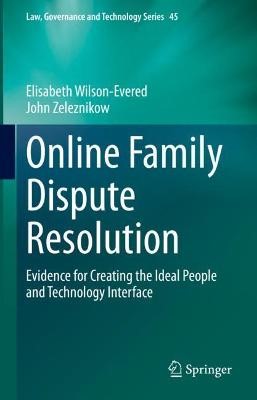
This book brings together the expertise of two authors involved in initiating the development of Online Family Dispute Resolution (OFDR), while also examining the unique Australian system. The family arena generally comprises property or child-related disputes arising between parents, whether married or not, and whether the parties have lived together or not. A special feature of Australia's OFDR system is that it deals with children's issues rather than focusing on property distribution.
The book first discusses how technological innovations have transformed dispute resolution services to families. It explores the need for OFDR and how such systems can potentially be implemented. In turn, the coverage shifts to screening tools used prior to a Family Dispute Resolution session to ensure that online systems are appropriate for the case under dispute and the people involved. Readers will then learn about the necessary training required - for administrators, practitioners and clients alike - for OFDR to be successful. In addition, the book offers a comprehensive evaluation of the system and reflects on the lessons learned to date. In closing, it suggests ways in which OFDR could be further developed and applied to family disputes around the world.